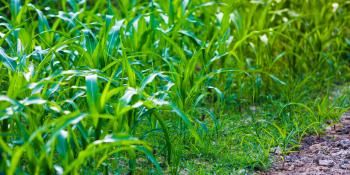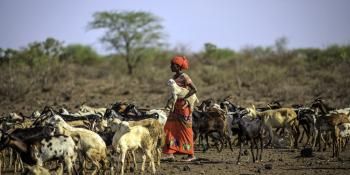Inspiring the youth towards smart farming through small-scale irrigation
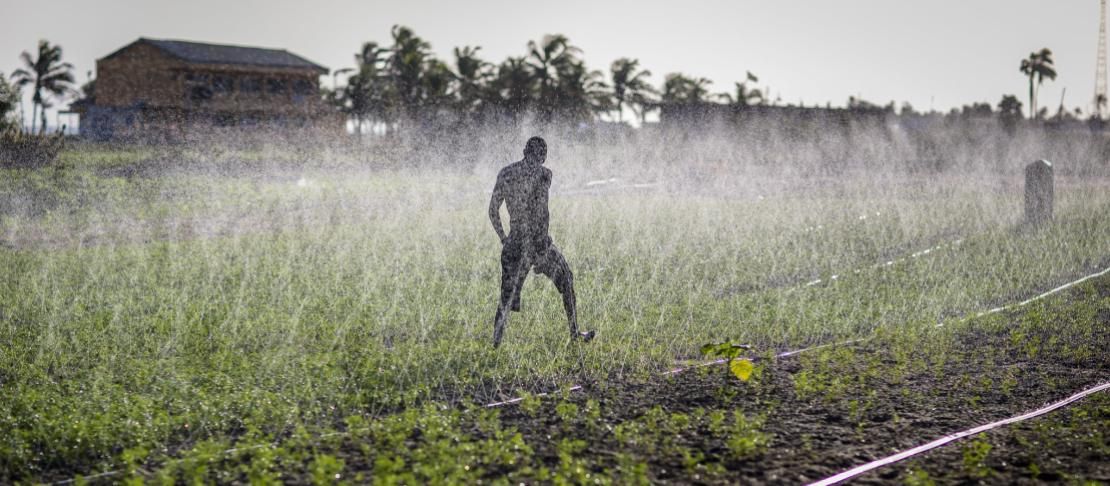
In the highly populated highlands of Ethiopia, where farmland is scarce, youth are usually disengaged from any meaningful activity associated with farming. The small size of their household land is often not enough to engage all the family members to make a substantial contribution towards enhancing food security. A lack of land and associated employment pushes youth towards urban areas, creating pressure on cities.
Devising opportunities for young people in rural areas to participate in income-generating activities and to resolve multiple crises, such as migration from rural areas and pressure in urban areas, is essential. Promoting irrigation schemes can be a key intervention area for unemployed youth to play an important role.
Catalyzing opportunities for young people through irrigation agriculture
A group of 11 youth from a small kebele called Angolela in Basona Worena Woreda (North Shewa Zone) in Ethiopia were engaged in the production of income-generating crops using irrigation, with the participation of Woreda experts and a team from the Alliance of Bioversity International and the International Center for Tropical Agriculture (CIAT). The discussion explored income generation opportunities for young people using irrigation agriculture on their family farmlands during the off-season.
Conversations delved into existing water harvesting ponds in their localities that are not yet being tapped into for irrigation purposes. Two small water-harvesting ponds that were constructed for multipurpose use by the government through the Agricultural Growth Program (AGP) were chosen for this purpose.
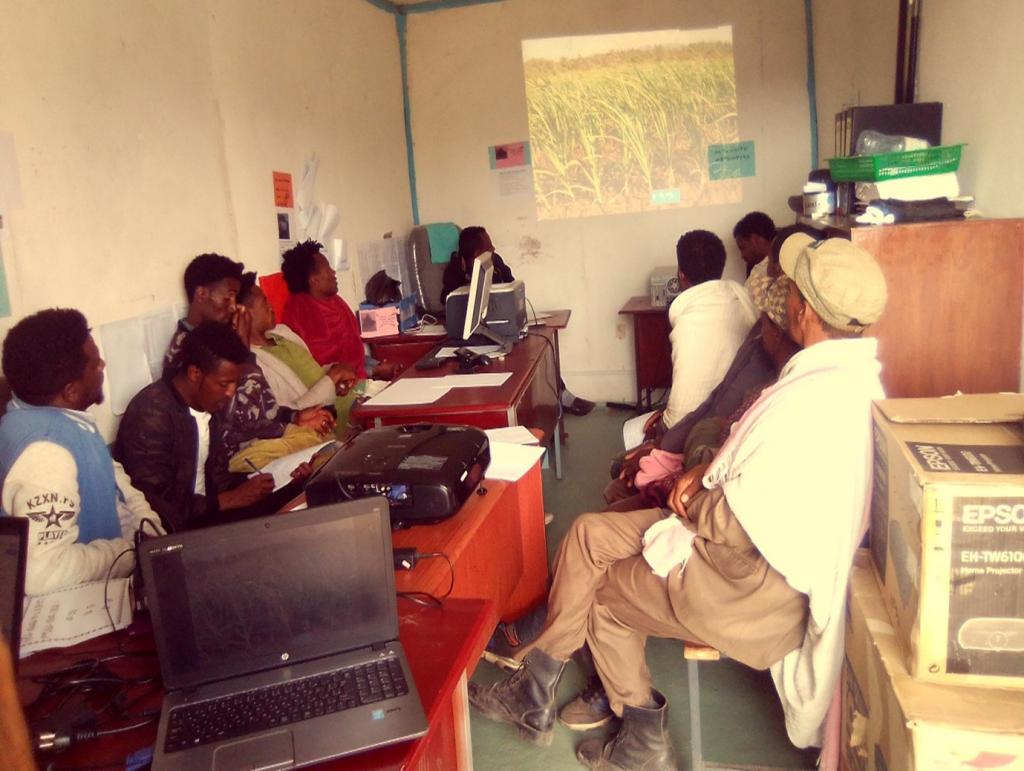
Meeting between the youth, irrigation experts from the Bureau of Agriculture, and experts from The Alliance at Debre Berhan Woreda Bureau of Agriculture. Photo: W. Abera (The Alliance)
During site visits, farmers and irrigation experts assessed the volume of water available and the potential and reliability of available water sources to adequately irrigate farmlands. Through these assessments and conversations with locals, youth and Woreda experts, it was concluded that the water available in both ponds can irrigate farmlands for 10-15 farmers.
Considering the available storage and refilling rate of the ponds after livestock use, the remaining water supply can be used to irrigate up to 10 hectares of land. Pump and hose were the preferred options to reduce seepage and evaporation loss. The Alliance provided support to maintain the pumps and buy hoses for the youth to uplift water from the ponds and convey water to the farmlands. Given the amount of water available and market opportunities, the youth suggested planting four commodities such as common beans, potato, onion, and carrot using these irrigation systems.
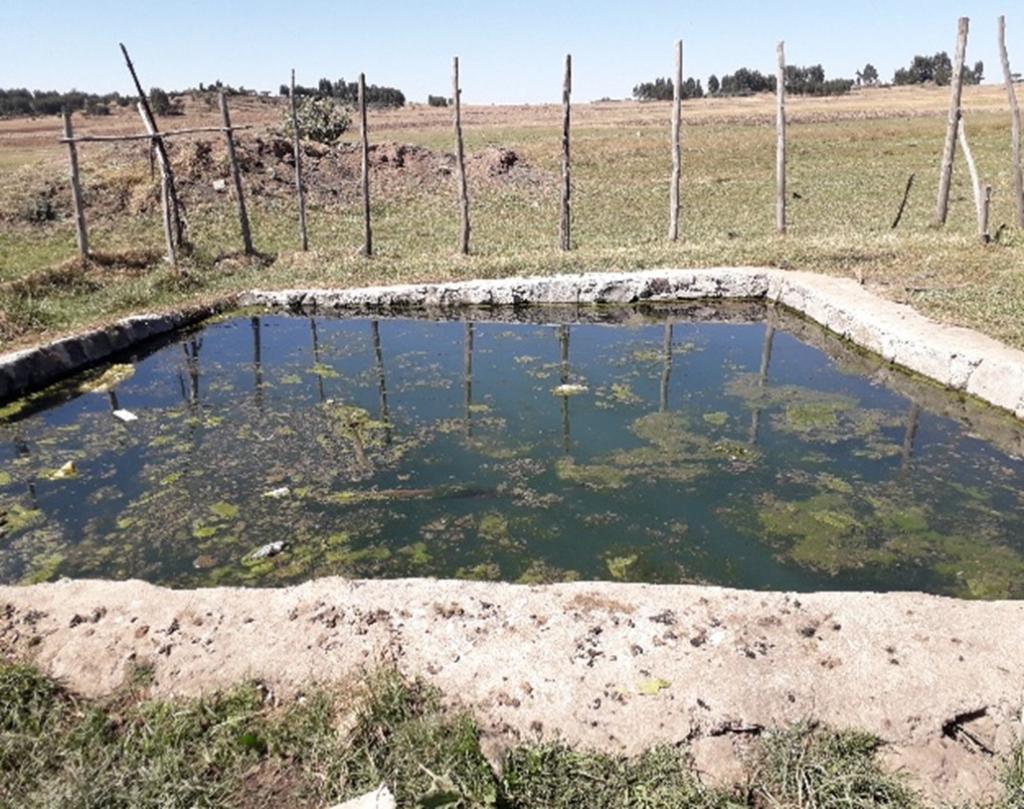
Small water harvesting ponds hold the potential to be used for irrigation agriculture. Photo: W. Abera (The Alliance)
Amplifying the impact of small-scale irrigation success stories
The Alliance, with the support of the CGIAR Research Program on Climate Change, Agriculture and Food Security (CCAFS), the European Union (EU), the International Fund for Agricultural Development (IFAD) and Africa RISING, solicited, purchased and distributed seeds from similar environments to the youth. In addition, they received training on land preparation, seed selection, planting, and efficient water use to ensure they apply relevant methods and techniques to obtain good yields and sustain the irrigation schemes, as well as create awareness for farmers in surrounding areas.
Three months later, these youth made their first harvests and were able to sell all of their produce. This opportunity created employment for 11 young people, who generated a total of 704,480 Ethiopian birr (around USD $22,000) (see Table 1). Mr Mekonin Mengistu, an irrigation department official at Basona Worena Woreda Agricultural Office, mentioned “what we have seen at the Angolela Kebele is a true role model for us to show the youth how business can be done and how they, the youth, can employ themselves in agriculture while at the same time generating very good earnings in a few months time. We are happy with the result and we will upscale the experiences to many areas in the Woreda”.
The youth are now prepared to buy their own seeds and plan to expand their schemes through optimal water application and diversified food sources. This approach will not only improve income through harvest sales but can also enhance their nutrition security through consuming vegetables. As such, water harvesting schemes guided by good agronomic practices and market information can provide employment for young people, making them productive role models for other farmers.
Commodity | Area (ha) | Total production (quintals) | Estimated price (birr) |
Potato | 2 | 340 | 258400 |
Bean | 2 | 36 | 1080 |
Onion | 2.5 | 137.5 | 385000 |
Carrot | 0.5 | 60 | 60000 |
Total | 7 | 573.5 |
*1USD = 32 ETB birr in May 2020
Table 1. Income generated by young farmers using small-scale irrigation across potato, bean, onion and carrot value chains.
Following this success story, we are now scaling the scheme to other parts of the Woreda. In addition, we have received requests from the Amhara region to map and characterize existing small-scale irrigation schemes to understand the potential and constraints in developing management plans and promoting small-scale irrigation, which can be key to supporting the food and nutrition security of smallholder farmers. Further analysis will be done to identify suitable crops, develop optimal irrigation practices, define markets (availability, etc.) and support the overall value chain to ensure that irrigation schemes in the country are productive, smart and sustainable. Using irrigation mapping of the region, we are developing an interactive visualization tool that can facilitate targeting and technology dissemination related to the irrigation sector.
Lulseged Tamene is a Senior Researcher at The Alliance of Bioversity International and CIAT. Wuletawu Abera is a Scientist at The Alliance of Bioversity International and CIAT. Kalkidan Mulatu is an International Consultant at The Alliance of Bioversity International and CIAT.
